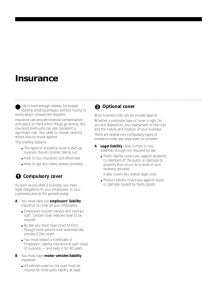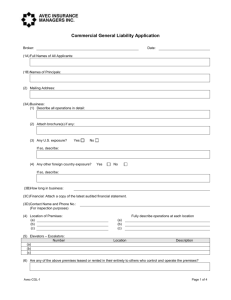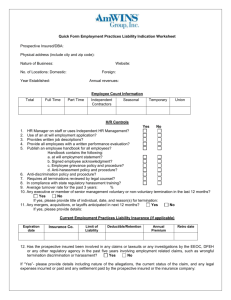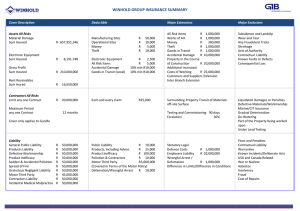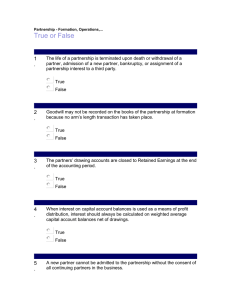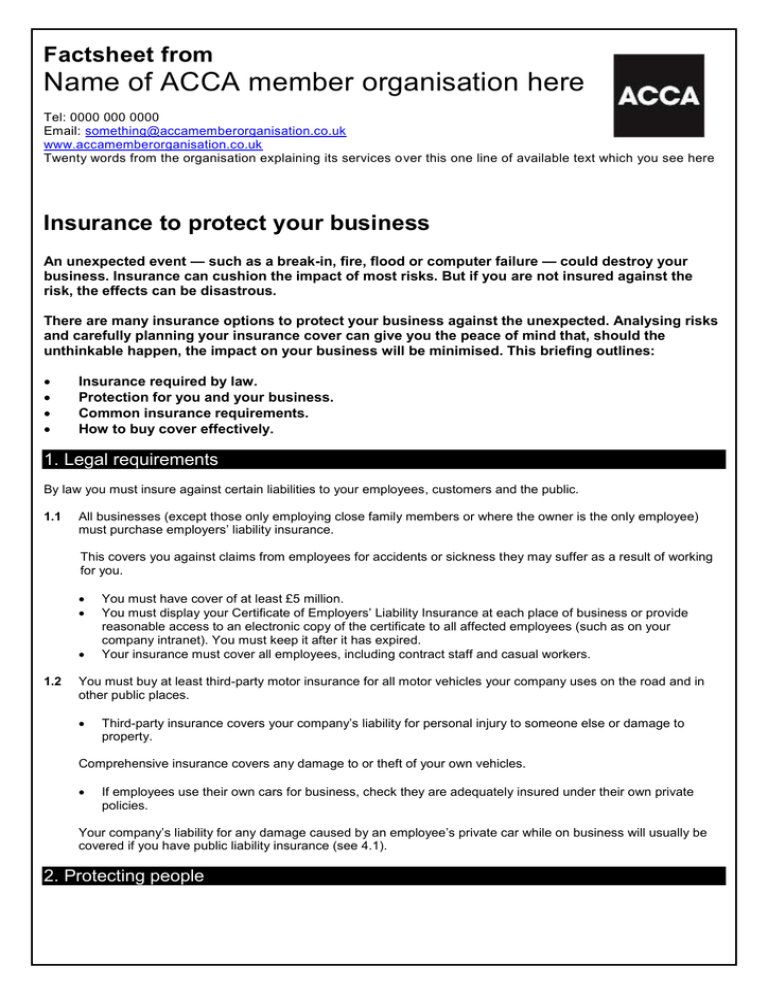
Factsheet from
Name of ACCA member organisation here
Tel: 0000 000 0000
Email: something@accamemberorganisation.co.uk
www.accamemberorganisation.co.uk
Twenty words from the organisation explaining its services over this one line of available text which you see here
Insurance to protect your business
An unexpected event — such as a break-in, fire, flood or computer failure — could destroy your
business. Insurance can cushion the impact of most risks. But if you are not insured against the
risk, the effects can be disastrous.
There are many insurance options to protect your business against the unexpected. Analysing risks
and carefully planning your insurance cover can give you the peace of mind that, should the
unthinkable happen, the impact on your business will be minimised. This briefing outlines:
Insurance required by law.
Protection for you and your business.
Common insurance requirements.
How to buy cover effectively.
1. Legal requirements
By law you must insure against certain liabilities to your employees, customers and the public.
1.1
All businesses (except those only employing close family members or where the owner is the only employee)
must purchase employers’ liability insurance.
This covers you against claims from employees for accidents or sickness they may suffer as a result of working
for you.
1.2
You must have cover of at least £5 million.
You must display your Certificate of Employers’ Liability Insurance at each place of business or provide
reasonable access to an electronic copy of the certificate to all affected employees (such as on your
company intranet). You must keep it after it has expired.
Your insurance must cover all employees, including contract staff and casual workers.
You must buy at least third-party motor insurance for all motor vehicles your company uses on the road and in
other public places.
Third-party insurance covers your company’s liability for personal injury to someone else or damage to
property.
Comprehensive insurance covers any damage to or theft of your own vehicles.
If employees use their own cars for business, check they are adequately insured under their own private
policies.
Your company’s liability for any damage caused by an employee’s private car while on business will usually be
covered if you have public liability insurance (see 4.1).
2. Protecting people
A small firm is often dependent on its people, particularly its owner. While insurance is commonly associated with
bricks and mortar cover, protecting people can prove as valuable to a business as covering premises and stock.
2.1
Key man insurance may be appropriate if the success of your business depends upon a few employees, such as
a specialist engineer or a key salesperson. Businesses run by owner-managers are particularly vulnerable.
Cover is usually equal to the estimated loss of profit that would result from that person’s death.
2.2
Critical illness cover provides a cash lump sum for specific employees in the event of a serious illness, such as a
heart attack.
2.3
Private health insurance and personal accident cover can help to retain and attract employees.
Prompt medical attention may also help enable employees to return to work more quickly.
2.4
Income protection insurance protects individuals by paying their salaries while they are incapacitated.
2.5
In certain circumstances, directors or executive officers of a limited company can be held personally liable for
their actions.
2.6
Directors’ and officers’ cover can be purchased by a company for directors without counting as a benefit in
kind for tax purposes. However, it must be bought and paid for separately from other insurances.
Travel insurance is strongly advisable for owners and employees travelling overseas.
3. Insure for common risks
Many threats are common to all businesses, including fire, theft and equipment failure. Consider each element
individually to ensure your business is adequately protected.
3.1
Most businesses buy an all-risks policy that protects buildings and contents against a range of risks, such as fire,
flood and theft in one policy.
3.2
If you own your premises, insure them for the full costs of rebuilding. This includes professional fees and
site-clearance costs.
If you lease or license your premises, check what insurance cover your landlord has and check the wording
of the lease.
Theft clauses cover stock and equipment when there has been forcible or violent entry to, or exit from, a
property.
Insure your stock at cost price. If stock volumes vary, use your highest value.
Insure any stock or equipment you keep on your premises, even if you do not own it.
Equipment failure can cause serious problems.
Specialist computer policies protect you against the costs of breakdown and loss of information, but they will
not cover the cost of upgrading to newer equipment.
Engineering policies cover most machinery against breakdown.
Comprehensive engineering policies will often include inspection and certification of your equipment as
necessary, organised by the insurer.
3.3
Equipment can be insured for the item’s value less a deduction for appropriate wear-and-tear, or on a
‘replacement as new’ basis. Check with your provider which cover your intended policy offers.
Money (including cash, cheques, stamps and other negotiable documents) is usually covered by a single all-risks
policy.
Different cover limits will apply to money on the premises, in safes and in transit.
2
Level of cover also varies according to the nature of your business and opening hours.
3.4
Goods in transit cover protects the value of goods lost or damaged while in your vehicle or when sent by carrier.
3.5
The sum insured is usually limited to a fixed amount for each vehicle or each consignment.
Marine cover may be needed if goods are going to or from overseas locations.
Business interruption insurance offers cover for any consequential losses suffered following the original loss (eg
after a fire).
3.6
Your policy may also require you to vary banking times and routes or take other precautions.
Many business insurance packages combine cover for loss of profits.
The amount of business interruption cover should be adequate to protect the gross profit as defined by the
terms of your policy, including any growth forecast during the maximum indemnity period.
Cover should include fixed costs, such as rent, as well as the extra costs of getting your business up and
running again.
Make sure the cover lasts long enough. Many businesses will need more than the standard 12 months to
make good the damage. Don’t underestimate how long it will take you to fully recover, including regaining
lost customers.
Make sure your policy covers all locations and consider extensions to cover you for disruption arising from
insured losses at suppliers’ or customers’ premises.
Staff honesty policies — sometimes called fidelity policies — cover against theft and other forms of dishonesty by
employees.
These elements are often sold to businesses as a package of policies, with cover tailored for specific sectors, eg
retailers, manufacturers, or construction firms (see box).
4. More specialised risks
There are other risks that should be covered if they pose a threat to your business. These can be bought individually or
bolted on to existing packages. Check if these could apply to you before finalising your insurance arrangements.
4.1
Public liability insurance covers damages payments and any legal costs to members of the public for death,
bodily injury or damage to their property which is caused by your business activities.
4.2
Product liability insurance is useful if you make, sell or repair products. You could be held liable for damage or
injury caused by defects in your products’ design or manufacture, even if you have not been negligent.
4.3
Product liability cover is often included with public liability insurance.
Credit insurance covers you against the risk of debtors becoming insolvent.
4.4
Consider the maximum claims that could be made against you when buying cover, as awards for serious
injury can exceed £1 million. Standard policies provide between £1 million and £5 million cover, but more can
be negotiated.
You can choose to insure whole or partial turnover and may be able to insure selected accounts.
Insurers will require you to carry at least 10% of the risk yourself.
Professional indemnity cover protects firms who give advice in a professional capacity (eg management or IT
consultants).
If you are proved to have been negligent, without cover, damages and costs can put you out of business or
even bankrupt you.
5. How to buy effectively
3
Once you have assessed the risks to you and your business, you need to work out how much cover is needed and
what steps you need to take to gain cover.
5.1
Calculate how much cover you need.
Insufficient cover is one of the main reasons insurance claims are not paid in full.
If you under-insure, your claim will be reduced by a similar proportion.
For example, your claim will be reduced by 10% if your cover was 10% less than it should have been.
5.2
Always insure your assets for their cost price. If cost prices vary, make sure you have cover up to their
highest levels.
Your policy should protect against inflation and sudden increases in the value of your stock, equipment or
liabilities.
When calculating all cover requirements, always allow for projected business growth.
Make sure you are fully aware of the terms and conditions of your insurance and that the insurance meets your
business needs.
You must disclose everything ‘material’ to your application. For example, past thefts, bankruptcy or
insolvency, or if an insurer has refused to cover you in the past.
Most policies require a minimum level of security. For example, you may have to install a burglar alarm or
sprinklers according to your insurer’s specifications.
Your insurer may send an insurance surveyor to assess the risks and recommend improvements before giving
you cover.
5.3
All insurance policies — even all-risks policies — have exclusions. For example:
Equipment failure due to wear and tear is not covered.
Theft insurance excludes shoplifting.
Building insurance may exclude subsidence cover, unless it is specifically requested.
6. Where to buy
When buying insurance, always get professional advice. There are a number of sources which can advise you as well
as sell the insurance.
6.1
You can deal directly with some insurance companies.
6.2
Insurance professionals can recommend policies that should be suitable for your business.
6.3
A company’s agent or sales person can only recommend suitable policies from the company’s portfolio.
Brokers and intermediaries should search a variety of providers on your behalf.
Some will receive a commission if you buy from them, while others will charge a fee.
You can also get helpful advice from industry bodies.
The Association of British Insurers (ABI) produces a range of leaflets (020 7600 3333 or www.abi.org.uk).
The British Insurance Brokers’ Association can recommend a broker (www.biba.org.uk).
7. Controlling the costs
Insurance premiums can be a significant business expense. There are ways to manage the costs.
7.1
Review the risks you insure against.
4
Many companies dispense with cover for risks that do not affect their business.
For example, a software consultancy may not require goods in transit cover if it does not transport any products.
7.2
Increase security.
7.3
Most policies have a standard excess.
Investigate the best-value deals.
7.5
Insurers often offer smaller premiums to businesses with good risk-management features.
A poor claims record may lead to increased premiums. It may even result in your insurer refusing to renew
cover.
A few policies offer no-claims discounts, achieved by not making a claim over a certain period of time.
Increase the amount you pay towards each claim — the excess or deductible.
7.4
Never cut the sum insured, as this will lead to under-insurance and a serious shortfall if you need to claim.
Pick a supplier that specialises in your type and size of business or policy need, as they are more likely to
offer competitive rates.
Obtain competitive quotes. But once you have built a relationship with an adviser, it is always worth offering
them the chance to match (or better) the quotes.
Different payment methods could ease cashflow or control costs.
You can spread costs by paying monthly.
Find out if you can make savings by buying longer-term cover.
All wrapped up
Insurance for small and medium-sized businesses is often sold in packages that group together the most common
requirements, such as employers’ liability, buildings and contents, money and business interruption.
Buying insurance as a package can save time for small businesses, as you only source and negotiate once
for all your insurance needs.
Some packages are tailored to cover specialist sectors (eg retail, construction or manufacturing).
Other areas of cover can be added to the package to meet individual businesses’ requirements.
Each insurer or intermediary offers packages comprising different core elements. Check the cover you
require against the package contents and add other cover as necessary.
Motor insurance should be bought separately.
Make sure you receive copies of the individual policy documents so you can check that the cover provided is adequate
and make a note of the warranties to be complied with.
Expert contributors
Thanks to Neil Cook (Equity and General Insurance Services Ltd, 01788 551 616)
Last updated 01.04.12
© BHP Information Solutions 2012. ISSN 1369-1996. All rights reserved. No part of this publication may be reproduced or transmitted without the
written permission of the publisher. This publication is for general guidance only. The publisher, expert contributors and distributor disclaim all liability
for any errors or omissions. Consult your local business support organisation or your professional adviser for help and advice.
5

